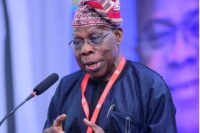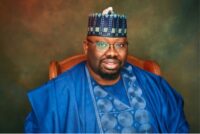Government and other stakeholders should create a sustainable support system for players, contends TIMI OLUBIYI
Amidst the exciting goals and passionate stadium cheers exists a worrisome reality: numerous Nigerian footballers conclude their careers insufficiently prepared, financially insecure, physically impaired, and mentally overlooked. Many retired Nigerian footballers, despite having earned significant sums of money during their careers, find themselves struggling financially soon after retirement. This is largely due to a lack of proper financial planning, poor investments, and the mismanagement of their earnings. This post-retirement crisis of depression has affected even some of the nation’s most renowned figures, including Peter Rufai, the former Super Eagles custodian who once captivated spectators with his talent and tenacity. Despite representing Nigeria internationally, and at the World Cup, notably and more recently Peter Rufai has encountered the harsh reality of neglect following his retirement. This has been the prevailing trend amongst football retirees. Peter Rufai’s narrative resonates with the experiences of many former footballers who once bore the aspirations of a nation but now endure hardship, grappling with health complications and minimal assistance. The typical Nigerian player, throughout his career, frequently encounters a combination of inadequate money management, insufficient education, lack of appropriate legal guidance, and absence of long-term strategic planning. Many of the players are of the illusion that they will leverage on their talents, and savings but fail to secure the stability of their retirement. These retirement failures are due to lack of financial education, and investment literacy. Nigerian footballers, in contrast to their colleagues in more developed footballing nations who enjoy strong player unions, pension schemes, and financial consulting services, frequently find themselves unsupported. Even injuries suffered over their career years often resurface later in life, accompanied by costly therapies that become unaffordable. The abrupt shift from fame and significance to anonymity and irrelevance imposes a psychological burden that few individuals are equipped to confront. Numerous accounts also exist of former celebrities in Nollywood and music industry too. After retirement they reside in deteriorated circumstances, soliciting public aid, or passing away discreetly without access to fundamental healthcare. This condition is rooted in a structural issue, originating from a football administration that favours immediate success over the long-term well-being of its sportsmen. Moreover, the absence of organised retirement planning or transitional programs for footballers by the Nigerian Football Federation (NFF) and the Ministry of Sports signifies a neglect of the persons who have elevated Nigerian football to prominence. In simple terms many retired Nigerian footballers do not benefit or have pension schemes or long-term financial plans after their playing careers. In contrast, football associations in countries like England or Spain provide players with comprehensive retirement programs and pension plans to ensure they remain financially stable even after they retire.
The harsh reality of retirement for Nigerian footballers is a growing concern that demands immediate attention. Therefore, a multifaceted strategy is urgently required to halt this slide. Initially, financial education should be integrated into player development programs at the grassroots level, instructing young players on the significance of budgeting, investing, and saving. More so mental health programs and education must be introduced to help retired footballers cope with the psychological challenges of retirement. Secondly, the NFF should formalise retirement savings programs, pension schemes, and compulsory health insurance for all players representing clubs and the national team. Furthermore, a welfare department inside the NFF must be formed to monitor and assist retiring athletes, guaranteeing they are not abandoned to manage alone. The government should enact legislation mandating retirement benefits and post-career healthcare access for national legislators, acknowledging their contribution to the country as a national duty. Public-private partnerships may be utilised to establish a Footballers’ Retirement Fund, financed through endorsements, league earnings, and sponsorships. Former athletes may transition into coaching, mentoring, or ambassadorial positions, so ensuring both financial compensation and continued significance. Corporate entities and NGOs should participate by establishing post-career training programs in entrepreneurship, coaching, and sports management. Peter Rufai, who previously endeavoured to promote fitness and youth development during his lifetime, could have received enhanced support to establish a legacy of mentorship programmes if the appropriate structures had been implemented.
In conclusion, without the implementation of systemic reforms, Nigerian football will persist in honouring stars on the pitch but neglecting them after retirement. Therefore, the government, the Nigerian Football Federation, football clubs, and agents must work together to create a sustainable support system for players, ensuring that they are financially secure, emotionally supported, and equipped with the skills necessary to thrive after their football careers. Without these reforms, many Nigerian footballers will continue to face a grim reality as they transition from their playing days to retirement. The call for reform is not just about securing the future of footballers; it is about acknowledging their contributions to the sport and ensuring that their lives after football are as dignified and rewarding as their careers on the field.
Dr Olubiyi is an Entrepreneurship and Business Management expert


















Leave a comment